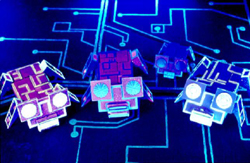What is nanning?
Not everything in Allegiance is about destroying enemy ships and stations: many aspects of the game require protecting and repairing your own. There's a repair gun in Allegiance called a "nanite repair gun" (or "nan" for short). Normally it can only be mounted on scouts, which makes them essential for escorting ships that will come under fire.
The nanite repair system remains a total mystery to the majority of pilots. You just fire a weapon at ships and stations, and they somehow get repaired. Well it's not so mysterious and, like everything else in the Allegiance universe, is based on real principles.
Reality
A nanomachine, also called a nanite, is a mechanical or electromechanical device of such a small scale that their dimensions are measured in nanometers. The width of a full stop is about 10,000 nanometres.
Nanomachines today are largely in the research-and-development phase, but some primitive devices have been tested. An example is a sensor having a switch approximately 1.5 nanometers across, capable of counting specific molecules in a chemical sample. The first useful applications of nanomachines will likely be in medical technology, where they could be used to identify pathogens and toxins from samples of body fluid. Another potential application is the detection of toxic chemicals, and the measurement of their concentrations, in the environment.
The microscopic size of nanomachines translates into high operational speed. This is a result of the natural tendency of all machines and systems to work faster as their size decreases. Nanomachines could be programmed to replicate themselves, or to work synergistically to build larger machines, or to construct nanochips. Specialized nanomachines called nanorobots might be designed not only to diagnose but to treat disease, perhaps by seeking out invading bacteria and viruses and destroying them.
Another asset of nanomachines is the fact that the individual units require only a tiny amount of energy to operate. Durability is another potential asset: nanites might last for centuries before breaking down. The main challenge lies in the methods of manufacture. It has been suggested that some nanomachines might be grown in a manner similar to the way plants evolve from seeds.
Non reality
High-speed operation and extremely long durability are characteristics of nanite repair systems. They can be programmed to destroy microorganisms, or repair circuitry. Eventually, they could be made capable of learning, evolving, reproducing, and other things we can't yet imagine.
In the Allegiance Universe, a nanite repair system is mounted and used just like a weapon. It fires a cluster of nanobots which latch onto ships and begin repairing their hull. Fire it at a ship, base, constructor, etc. and it will repair hull damage.
Why do you have to fire continuously? Why is it an energy-powered system? Why can't you skip the middle man and just put them directly onto your own hull? These are solely game aspects which were introduced for balance purposes, and don't reflect reality. However, nanites are quite real, and are a nice addition to the game by the developer.
Nanning and the Phoenix faction
The Dark Nebulae core has a faction called Phoenix whose ships cannot be repaired. However nans still work on Phoenix's AI ships (miners, constructors, carriers, etc) and stations.
Note Phoenix is not available on the most commonly played core, Community core (as of May 2009).
Nanite repair gun exceptions
- Nanite repair guns may not be used to repair asteroids.
- Belters are a very ubiquitous faction and can mount nanite repair guns in most of their small class ships.
- Technoflux can mount a second nan in the 2nd weapon slot of advanced and heavy scouts.
- Ga'Taraan scouts have their nan permanently mounted in their 2nd weapon slot. [remember to deactivate it when attacking enemy ships, it heals them too!]

